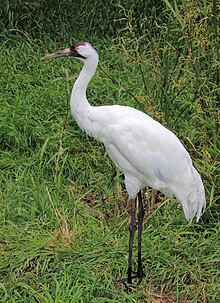 |
 |
For a couple decades now, it hasn't been unusual to hear right-wingers gripe about the Endangered Species Act, which gives the federal government some latitude in identifying species that are in danger of extinction and taking measures to prevent that from happening. Still, most complaints have been mere noise: rather than attack the principle of saving endangered species, they look for loopholes -- some way to clearcut a forest, say, without noting that the last remaining spotted owls live there. However, the rhetoric has escalated recently here in Kansas, where Secretary of State Kris Kobach is pushing a bill to expedite the extermination of prairie chickens (see Kobach urges tough Kansas bill on prairie chickens), going so far as to make it felony for the federal government to try to enforce the Endangered Species Act (ESA) anywhere in the state of Kansas. Moreover, other state senators (all Republicans) are trying to expand Kobach's bill to exempt another 70 endangered species, including whooping cranes, from ESA protection (see Wildlife, conservation bills stir strong feelings in Kansas).
The ESA law was laudably idealistic when it was passed in 1973, but it also came too late for many dozens of species that vanished since Europeans first settled in North America -- not to mention the many more species that became extinct after the first people arrived in North America some 10,000 years ago. The initial popularity of the law was probably based on several naive sentiments, like the assumption that its implementation wouldn't be much burden -- and for most people it really hasn't. Its opponents are shortsighted landowners who host or border endangered populations, and have designs to use that land in ways that destroy habitat needed for the survival of those species. Such people (or more often corporations) are few and far between, but they smell money to be made so they make a stink about it, enough noise to capture the allegiance of greedy right-wingers like Kobach. Deep down, they believe that owning a property should give them an unlimited right not just to exploit it for personal profit, but to destroy anything on that land that stands in their way. Moreover, they do not believe that the public has any rights or business limiting what they do with their property. Such ideas would be laughable -- laws have long placed limits on usage (zoning) and enforced liabilities (e.g., on externalities like pollution) -- but the right wing's ideological drive has been toward ever greater business "freedom" (a term which more and more means a lack of restraint and responsibility).
Kobach's statute, like most of what he proposes, is almost certainly unconstitutional in that it seeks to use state law to nullify federal law -- the only reason for waffling at all is that the current US Supreme Court has become so political that a majority recently ruled that the rich have a "free speech" right to bribe politicians. One thing you can be sure of is that Kobach follows no underlying legal or philosophical principle: figuring that the state government of Kansas, with deranged governor Sam Brownback and three-quarter Republican majorities, recently purged of nearly all "moderates," is his ideal power base, Kobach has supported laws both to nullify federal gun controls and to prevent any local Kansas towns or counties from passing their own gun control laws. The working principle for conservatives these days is to use any formula that gets them their desired ends: stacking the courts, rigging elections, flooding elections with special-interest money, or just dispensing with them altogether (e.g., some Republicans recently introduced a bill to make it illegal for certain Kansas counties to vote on allowing casino gambling).
You'd think such unscrupulous contempt for democracy would be met with a hysterical reaction, but thus far no affront has done the trick. If people really understood the consequences of giving Republicans the sort of unlimited power they enjoy in Kansas, the results would be catastrophic even way beyond the precedent set by G.W. Bush. But one might still cling to the hope that bad policies are still reversible: things may get awful for a while, but eventually the pendulum swings back. Extinction, on the other hand, is irreversible, which is one reason this attack on the Endangered Species Act seems so brazen, so terrifying, and so thoughtless.
By the way, on biodiversity, see E.O. Wilson: The Diversity of Life (1992, Harvard University Press). Wilson goes to great lengths to stress the economic value of biodiversity -- more so than I think is necessary (or even desirable), as I've found that I value the existence of most life forms even if I never interact with them: at the very least they enrich my understanding of the world, and that's one of the things I treasure in life.
To put the Endangered Species Act into a broader context, see David Quammen: The Song of the Dodo: Island Biogeography in an Age of Extinction (paperback, 1997, Scribner). The new book by Elizabeth Kolbert: The Sixth Extinction: An Unnatural History (2014, Henry Holt) is probably also worthwhile.